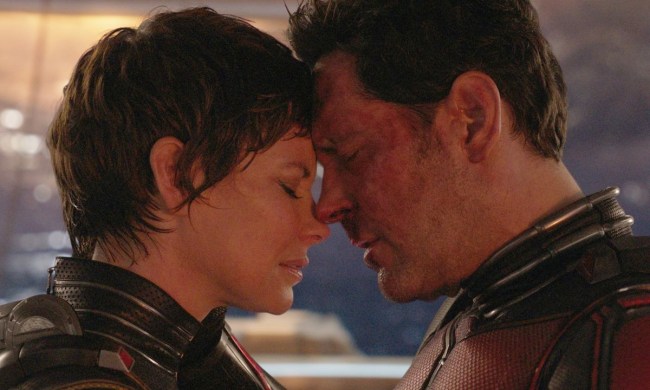Paul Rudd is incredibly handsome, but the idea that he would ever lead an entire superhero franchise might have, at one time, seemed a little far-fetched. For as charismatic as he is, Rudd’s defining quality on screen has always been his silliness. As it turns out, that’s precisely what made Ant-Man the perfect character for him to play.
The original Ant-Man, which is now 10 years old, came out at a time when Marvel was already dominant but not yet the supreme force that it would become in the years ahead. Crucially, this is a movie that doesn’t matter all that much. It’s a movie about an amateur thief tasked with preventing a tech mogul from weaponizing ant technology for evil ends. The thief is played by Rudd because why not! Then, he learns how to be super small and gets to hang out more with his daughter.
It’s all very, very silly! And that’s part of what makes Ant-Man the most interesting franchise in the entirety of the MCU. That’s not to say it’s the best, but it’s one of the few franchises in the MCU that has some sense of internal cohesion. Let’s dive into why these movies, and the first installment in particular, work so well:
They know how to take advantage of Ant-Man’s powers
To the immense credit of director Peyton Reed and the folks at Marvel, Ant-Man’s powers are often some of the most fun to watch on screen. That’s in large part because his powers are totally distinct from anyone else in the MCU and because they can have a lot of fun with the size of various everyday objects. Do you want to see an office building in a tiny size? This movie has that. Do you want to see a giant salt shaker? We’ve got one of those.
Although those gags are good in and of themselves, they are reinforced by choreography that gets at all the ways you imagined Ant-Man would use his powers to take on bad guys. It’s easy to overlook those sections of the movie because they exist on the comedic end of the Marvel continuum, but the first two Ant-Man movies are remarkably inventive in their fight choreography. You get the sense that there was a brain trust responsible for figuring out how to make the stunts look both silly and realistic, and they nailed it.
Paul Rudd turns out to be the ideal vehicle for all this

One of the most remarkable things about Avengers: Endgame is that, while the movie is chiefly about the core Avengers, Rudd’s Scott Lang is in it a shocking amount. Scott is crucial to the film’s plot mechanics, and he proved to be such a revelation in his own movies. Rudd’s overt silliness is a wonderful addition to the ensemble movies he’s cast in, but the Ant-Man movies know how to make it work as its own distinct flavor, too.
Rudd’s Scott is a fun guy, but he knows how to put just the right amount of saccharine sweetness into the performance. His connection with his daughter is genuinely moving, and the times when we do get to see them together are emotional. Rudd, who comes from the Apatow school of sentimental laughs, knows how to make himself both a silly guy and, fundamentally, a good dad. It’s that combination that makes the Ant-Man movies and Ant-Man the character work.
Ant-Man is good when Ant-Man is self-contained

The first two Ant-Man movies are good precisely because not a whole heck of a lot of consequence happens in them. Ant-Man fights a bad guy and emerges victorious. He gets into a lot of shenanigans along the way, and that’s really about the sum of it. Ant-Man and the Wasp: Quantumania is worse than the first two films precisely because Marvel tried to use it to launch an entire supervillain. While there’s still plenty of silly stuff in the movie, the more actual universe-building these movies have to do, the worse they tend to be.
So the fondness I have for Ant-Man and its first sequel stems mainly from how fun both movies are and how much it feels like you can walk out of them without worrying about Kang or any other massive threat to the Marvel universe. Scott’s just trying to spend time with his daughter and be a decent guy, and at the end of the day, the movies that focus on him and on his escapades are the most fun to watch.
You can watch Ant-Man on Disney+.




